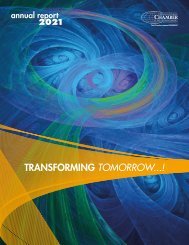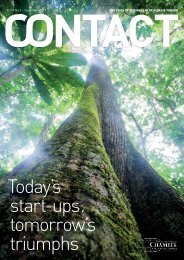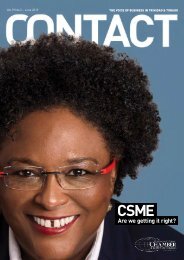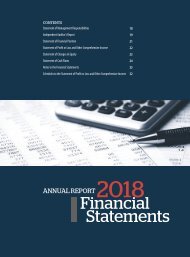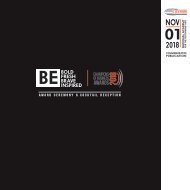You also want an ePaper? Increase the reach of your titles
YUMPU automatically turns print PDFs into web optimized ePapers that Google loves.
transforming t&T<br />
Do we really<br />
like it so?<br />
Our resistance to change is rooted deep in the national culture<br />
Sunity Maharaj discusses We Like It So?: The<br />
Cultural Roots of Economic Underachievement<br />
in <strong>Trinidad</strong> and <strong>Tobago</strong> by Terrence W. Farrell<br />
A<br />
lifetime’s worth of experience as an economist at the highest levels of<br />
the public and private sectors of <strong>Trinidad</strong> and <strong>Tobago</strong> has left Dr Terrence<br />
Farrell with the question posed in the title of his 2017 book, We Like<br />
It So? This follow-up from the author of The Underachieving Society:<br />
Development Strategy and Policy in <strong>Trinidad</strong> and <strong>Tobago</strong>, 1958-2008 is both a quest<br />
to understand the source of West Indian economic underachievement and a clarion<br />
call for change.<br />
For a while, Farrell is detained by such theorists as the Dutch cultural researcher<br />
Geert Hofstede and the American psychologist David McClelland, whose work in<br />
culture, attitudes and behaviour enjoys international currency in the corporate<br />
world. However, he quickly comes up against the limitations of cultural extrapolation<br />
in the findings of a McClelland-inspired survey conducted in <strong>Trinidad</strong> and <strong>Tobago</strong>.<br />
According to the World Values Survey (WVS) 6th Wave (2010-2014),<br />
Trinbagonians value work more highly and leisure slightly less than global averages.<br />
They are also far less tolerant of corruption than the average person in other<br />
countries, with over 87 per cent of the Trinbagonian respondents saying bribery is<br />
never justifiable, compared to the global sample of 69 percent.<br />
Farrell knows quite enough about his country to recognise that such findings<br />
do not square with reality. “These anomalous or counter-intuitive results probably<br />
arise because people respond the way they think they are expected to respond,” he<br />
remarks. He ascribes the tendency to “ambivalence”, a cornerstone of his developing<br />
theory about the cultural roots of the phenomenon of economic underachievement<br />
in energy-rich <strong>Trinidad</strong> and <strong>Tobago</strong>.<br />
The intellectual context<br />
In fleshing out his analysis and argument, Farrell picks his way through the work of a<br />
broad spectrum of thinkers, social scientists, novelists and poets who have plumbed<br />
the Caribbean condition and provide theoretical ballast for his argument.<br />
For graduates of an education system that remains disconnected from its<br />
Caribbean moorings, We Like It So? is a useful introduction to the substantial body<br />
of Caribbean thought developed over the 19th and 20th centuries, going back to<br />
John Jacob Thomas, the revolutionary intellectual born in Cedros in 1841, three<br />
years after Emancipation.<br />
30<br />
<strong>Trinidad</strong><br />
and <strong>Tobago</strong> Chamber<br />
of Industry and Commerce<br />
www.chamber.org.tt/contact-magazine



